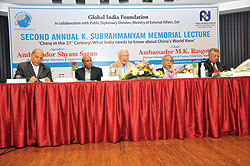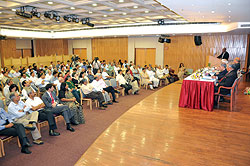Days before West Bengal chief minister Mamata Banerjee walked out of the UPA alliance, the WB State General Secretary of the Congress Party, Prof O.P. Mishra, spoke to Indian Empire’s Anjay Sinha in an exclusive interview. Hardly showing any signs or intent of mincing words, the out-spoken spokesperson explains why in the long run Mamata needs the Congress more than the Congress needs her. Especially if the Left Front was to be prevented from re-gaining strength at the 2014 general elections. According to Prof Mishra, the last assembly election results indicate that the CPM (Communist Party—Marxist) has not lost its core vote-banks. Analyses reveal that the margin of vote-share between CPM and Mamata’s TMC (Trinamool Congress) is only between 3 to 4 percent. It is the Congress’s vote that TMC has got because of the seat-sharing alliance between the parties.
The general secretary who also wears a hat of professor of International Relations at the Jadavpur University bluntly said, “the party doen’t want a break, but we do not mind a break-up.” He admitted openly to strained relationship between TMC and WB Congress after a year together in power
|
Why do you say that Congress has always given Mamata than what she claims to have received?
If you look at Mamata's political career, she owes it to the Congress. The party gave her a Lok Sabha ticket at age of 27, which she won. In the next general election she lost but party adjusted her at the national level. Even the South Kolkata seat from which she had won the last Parliament election before she resigned to become Chief Minister and get elected for the West Bengal assembly, is a traditional Congress seat. The party's candidate has always won from this seat. So her current success is also due to the goodwill of Congress voters.
What are main reasons for growing differences between the two parties?
Both the parties fought together in the 2009 Lok Sabha elections and in the 2011 Assembly elections in West Bengal because the TMC knew very well that it would not be able to bring down the Left on its own. It needed the Congress, and earlier, it needed the BJP. Now it is also part of the UPA (United Progressive Alliance). Just at a time when our relations are supposed to be cordial and expected to be improving, the reverse is happening. The TMC’s desire is to capture Congress' entire political space which the party would naturally contest. And we have been successfully doing that. Moreover the party expected TMC to respect the sacrifices the Congress made while accommodating it in the Lok Sabha and the Assembly elections. But they have been most uncooperative when it comes adjusting with us at the grass-roots and district levels, which matters the most in politics. Because of their attidue, almost in all the blocks, the Congress and the Trinamool are at loggerheads.
There is no coordination mechanism between the two parties. Even senior pradesh leaders simple request are ignored and snubbed by the Government.
 |
 |
| From left: Professor Mishra with former Indian foreign secretaries Shyam Saran, M K Rasgotra, Salman Haider |
A section of the audience at the lecture being delivered by Ambassador Saran |
Is there a way out to resolve the issues between the two parties?
The root cause of problem is that both parties have been competing for the same political space. After grabbing power, the TMC is now relentlessly pursuing Congress's defectors. They are also adopting unfair means to engineer defection from the Congress at the district, municipal and panchayat levels. No party can keep silent in such a situation.
The differences could only be resolved if the TMC functions in a non-partisan manner. It needs to stop engineering defections and constitutes a coordination mechanism to address governance issues, stops politicising social issues, and maintains impartiality in administration.
Is there any truth in talk of the Congress going it alone in the panchayat elections?
Since we are main-stream political party, we are expected to contest on our own. The question of seat adjustment arises when the views and interests of two or more parties converge. In the last panchayat elections there was no official tie-up with the Trinamool, but at the grass-roots level, adjustments and arrangements did take place. The Pradesh Congress leadership usually does not interfere in these processes.
The question of seat adjustment with the Trinamool may be decided at the block or district level. But the Pradesh Congress will encourage its workers to contest the elections. Wherever we are in a position to contest on our own, we will definitely do so, and our strength is rising.
In such circumstances, it is difficult to assess the future course of action. We don't want to fully severe the ties. While we are interested in sailing alongside the Trinamool, we are not prepared to sink with it—given the policies that the Trinamool-led Government are following.
Has Central Party leaders pressure to go soft on Mamata due to her crucial support at the Centre?
It is to our credit of Central leadership that they never discouraged us from undertaking political programmes—even those that are critical of the State government. But we fought the elections together, so it is expected that we would have an interdependent relationship. However, the Trinamool Congress is volatile and has taken strong stands, most of which are generally not in line with the policies of development and governance.
A section of the Congress leadership, including me, has been maintaining that the Congress' self-esteem and pride should not be compromised under any circumstances. Yet, it has repeatedly happened in this alliance.
Let us now talk on national politics. What is our opinion of Team Anna floating own political party? Will it impact Congress?
The Team Anna decision to form a political party is a welcome move. In my assessment, the two biggest parties, Congress and BJP is not going to be impacted by their presence. In fact the Congress is only going to benefit as so called anti-corruption votes are going to split among opposition parties. In such a scenario, the party's traditional votes would be enough to make us victorious.
|